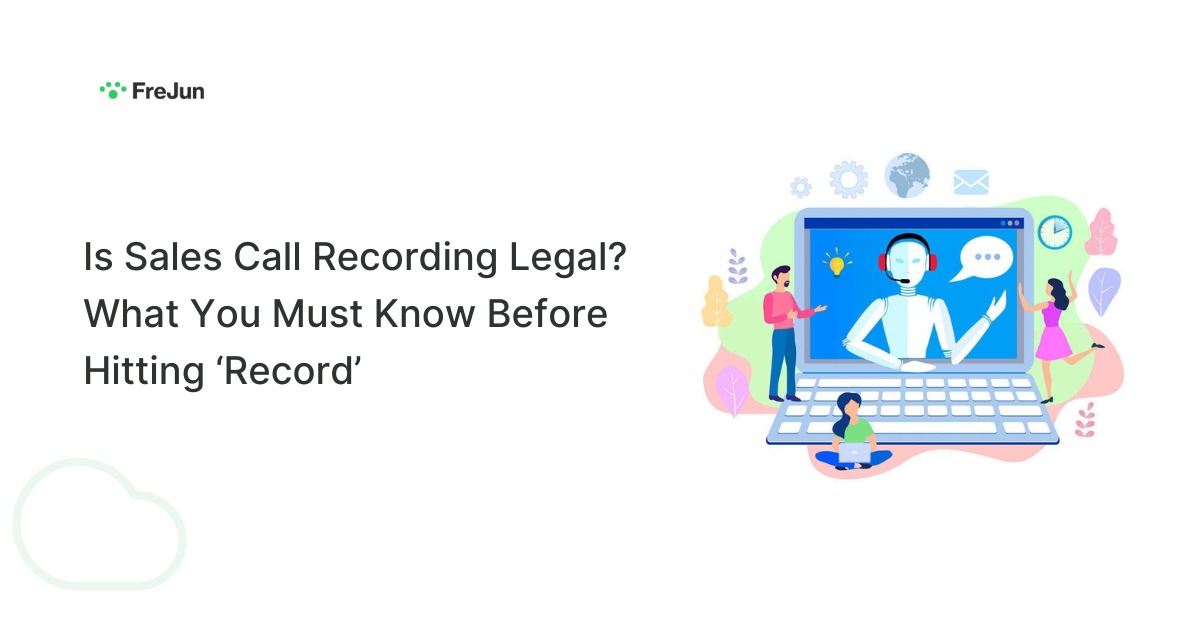Last updated on November 13th, 2025 at 12:16 pm
Today’s sales teams are more distributed, data-driven, and customer-centric than ever. As conversations move across borders and channels — Zoom, WhatsApp, mobile, Voip — the need to document and analyse sales calls has never been greater.
While the benefits of recording sales calls are widely acknowledged, many businesses remain unsure about one critical aspect
Is Sales Call Recording Legal in 2025?
- Global Rule: Legality depends on location. India is generally a one-party consent state, while the UAE requires two-party (all-party) consent.
- India Update 2025: While individuals enjoy one-party consent, businesses must adhere to the DPDP Act, making disclosure highly recommended for customer service call recording laws.
- Best Practice: Always use an automated “This call may be recorded” disclaimer to ensure safety across all jurisdictions.
- Tooling: Use compliant software like FreJun to automate consent logging and secure storage.
In 2025, compliance is not a checkbox — it’s a core part of your operational integrity. This blog offers a detailed overview of sales call recording laws in India, the UAE, and other key global regions. We’ll also provide actionable tips on how to stay compliant while still gaining the full performance and insight benefits of recorded conversations.
Table of contents
- Why is Sales Call Recording Critical for Revenue Teams in 2025?
- Is Recording Sales Calls Legal? Global Guidelines Explained
- What Is the Difference Between One-Party and Two-Party Consent?
- Is It Legal to Record Phone Calls in India? (One-Party Consent 2025 Rules)
- What Are the Sales Call Recording Laws in the UAE?
- How Do Call Recording Laws Vary in the USA, UK, and Europe?
- What Are the Best Practices to Record Sales Calls Legally?
- How FreJun Supports Compliance Across Jurisdictions
- Global Consent Comparison Table
- Final Thoughts
- FAQs
Why is Sales Call Recording Critical for Revenue Teams in 2025?

Sales is no longer just about pitching and closing. It’s about understanding your buyer, refining your message, and delivering a consistent experience — across every rep and every conversation.
Call recording enables:
- Smarter onboarding and training
- Accurate, personalised follow-ups
- Data for coaching, analytics, and team improvement
- A record of commitments, pricing, and terms for accountability
- A source of “Voice of the Customer” insights for product and marketing
In remote sales environments, recordings also replace the traditional “ride-along” experience. Sales leaders can listen, analyse, and coach — without being on every live call.
When done correctly and legally, sales call recording is a high-leverage strategy that benefits every part of your revenue engine.
Is Recording Sales Calls Legal? Global Guidelines Explained
The legality of recording sales calls depends entirely on your location, your customer’s location, and how you obtain consent.
While most countries allow call recording under certain conditions, the rules vary widely:
- In some regions, you only need the consent of one party on the call (e.g., India, UK).
- In others, you need the consent of all parties before recording (e.g., UAE, Germany).
Additionally, laws often distinguish between personal and business use. What’s acceptable for internal team training might be unacceptable if the same recording is used in a legal dispute or shared externally.
If your business serves customers in multiple countries, it’s essential to know which laws apply to each call you make.
What Is the Difference Between One-Party and Two-Party Consent?
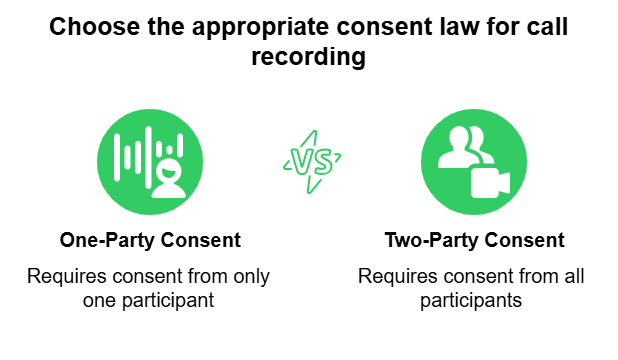
A two-party consent state is where both or all parties should consent to the recording of a conversation. This is in contrast to a one-party consent state, where only one party needs to consent to the recording. Consent is the cornerstone of legal call recording. The type of consent required can be broken down into two broad legal frameworks:
One-Party Consent
- Only one person on the call needs to know it’s being recorded.
- This is often the sales rep themselves.
- Recording is legal even if the other person isn’t informed.
- Common in countries like India, the UK, and many U.S. states.
Two-Party (or All-Party) Consent
- Everyone on the call must be informed and must agree to be recorded.
- Silence or staying on the call after a disclaimer may count as implied consent in some regions.
- Mandatory in countries like UAE, Germany, Australia, and parts of the U.S. (like California).
The safest approach?
Always inform your customers at the start of the call that the conversation may be recorded.
Is It Legal to Record Phone Calls in India? (One-Party Consent 2025 Rules)

India follows the one-party consent rule, making it one of the more business-friendly environments for call recording. As long as one person on the call (typically the sales rep) is aware that the conversation is being recorded, it is legal to do so without informing the customer.
Key points:
- You can record calls you’re part of without the other party’s consent.
- Disclosing the recording is not legally required, but it can still be a best practice.
- Public disclosure, misuse, or unauthorised sharing of recordings can lead to privacy violations under the Information Technology Act (Section 72).
- Intercepting calls you’re not part of (i.e., wiretapping) remains illegal.
Tip: Even though it’s legal, transparency can help build trust — especially when recordings are stored or used in onboarding or escalation.
What Are the Sales Call Recording Laws in the UAE?

The UAE enforces one of the strictest recording consent laws in the world. Under the UAE Cybercrime Law (Federal Law No. 5 of 2012) and regulations set by the TDRA (Telecommunications and Digital Government Regulatory Authority):
- Recording a call without consent is a criminal offence.
- The law applies to both phone calls and digital voice communications (e.g., WhatsApp, Zoom, Voip).
- You must inform the customer in advance and obtain explicit verbal or written consent.
- Violations can result in fines of up to AED 500,000 and imprisonment.
Best Practices in the UAE:
- Always include a clear pre-call disclaimer.
- Obtain verbal confirmation (e.g., “Yes, I agree to be recorded”).
- Use licensed Voip tools that are compliant with UAE telecom laws.
Never assume silence equals consent in the UAE. Always confirm it before you record.
How Do Call Recording Laws Vary in the USA, UK, and Europe?
For globally operating sales teams, it’s essential to understand how different countries treat call recording. Here’s an overview of key markets:
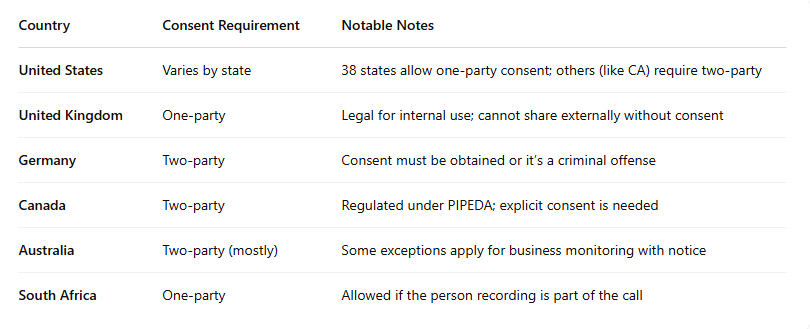
Always research the stricter law that applies based on both the rep’s and the customer’s country. When in doubt, disclose.
What Are the Best Practices to Record Sales Calls Legally?
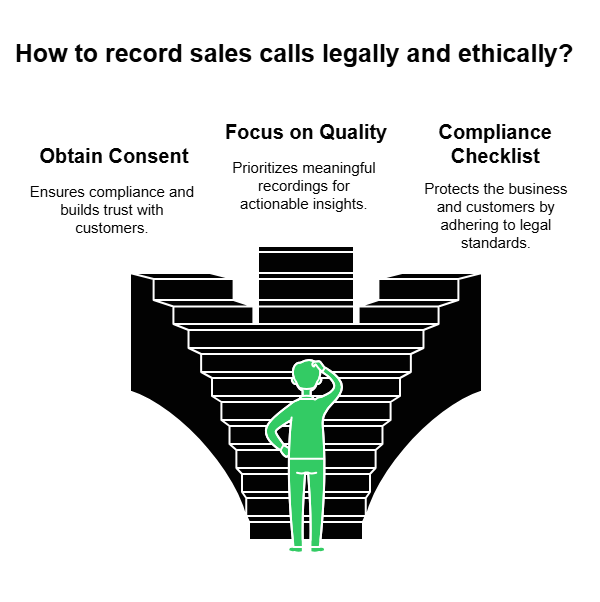
- Obtain Consent: Always inform your customers and obtain their permission before recording conversations. This builds trust and complies with legal requirements.
- Focus on Quality, Not Quantity: Record select calls that can provide valuable insights — every call adds data, but not all are impactful.
To protect your business, your customers, and your reputation, every sales call recording policy should follow a clear compliance framework.
Compliance Checklist for Call Recording:
- Enable automated disclaimers on every outbound call.
- Use CRM-integrated tools like FreJun to log consent status.
- Train reps to verbally confirm consent in two-party regions.
- Avoid sharing call recordings externally without written approval.
- Store recordings securely with access control and audit logs.
- Delete or anonymise recordings upon request in line with data privacy laws (e.g., GDPR, PDP Bill).
- Keep records of consent and usage for audit readiness.
Building compliance into your sales workflow helps avoid accidental violations and builds long-term customer trust.
How FreJun Supports Compliance Across Jurisdictions
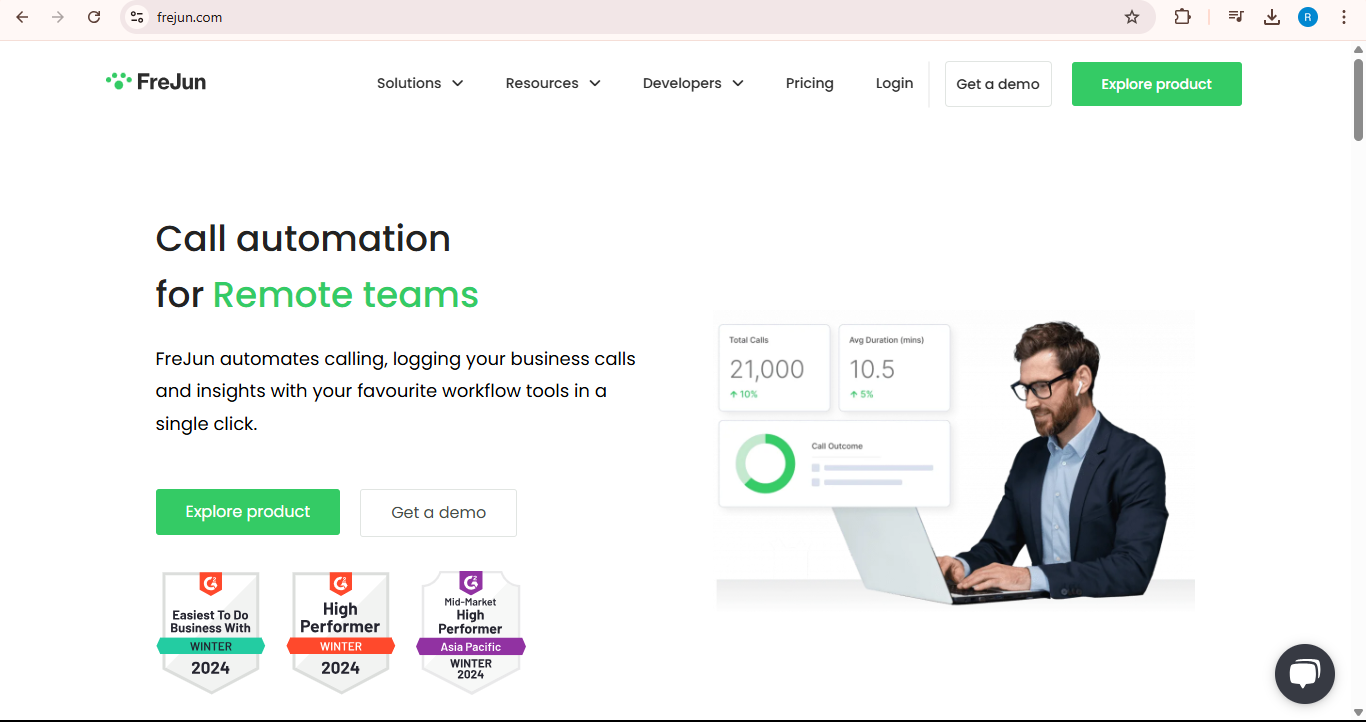
FreJun isn’t just a calling tool — it’s a compliance-friendly communication platform designed for distributed, international teams. FreJun offers one of the most seamless CRM’s integrations available today. Designed for fast-growing sales and support teams, FreJun automates call logging, records conversations, and even tracks deal progress — all within your Salesforce workspace.
FreJun Compliance Features:
- Automated call disclaimers before every outbound call
- Consent tagging and confirmation logs
Discover How FreJun’s Call Recording Works
- Secure cloud storage with encryption and access control
- Region-specific settings for UAE, India, UK, US, etc.
- Easy-to-manage call libraries for internal coaching
How FreJun’s AI Enhances Business Communication
- Export logs for audit trails and legal review
FreJun helps your sales team record smarter, not riskier — so you can focus on growth, not legal headaches.
Why Choose FreJun: It offers unmatched AI features, workflow automation, and CRM syncing at a fraction of the cost of competitors.
Pricing: Standard: Begins at $14.49 per user, per month.
Professional: Starts at $16.69 per user, per month.
G2 Rating: 4.9/5 (Read Reviews)
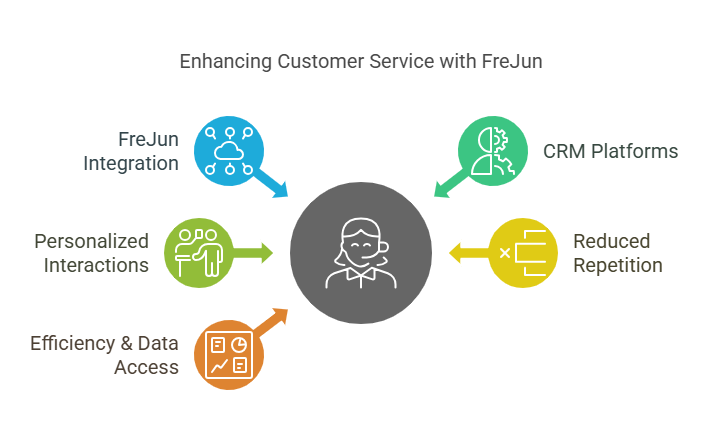
Global Consent Comparison Table
| Country | Consent Requirement | Key Legal Framework |
| India 🇮🇳 | One-Party Consent* | Information Technology Act 2000; DPDP Act 2023 |
| UAE 🇦🇪 | Two-Party Consent | Federal Law No. 5 (Cybercrime); TDRA Regulations |
| USA 🇺🇸 | Mixed (State-dependent) | Federal Wiretap Act; individual state laws (e.g., CA is Two-Party) |
| UK 🇬🇧 | One-Party Consent (Business) | GDPR; RIPA 2000 |
| Australia 🇦🇺 | Two-Party Consent | Telecommunications (Interception and Access) Act |
Final Thoughts

Sales call recording is one of the most valuable tools in your revenue stack—but only when it’s used legally, transparently, and respectfully. In today’s privacy-aware climate, customers value openness. Informing them that a call is being recorded not only ensures compliance but also builds credibility.
By following the laws in each country and using tools like FreJun to automate the process, you can record confidently, coach better, and scale sales with integrity.
Record smart. Stay compliant. Build trust — one conversation at a time.
Start Recording the Right Way with FreJun →
Your CRM-Connected, AI-Powered, Legally Compliant Sales Communication Platform
Further Reading: Does TurboHire Support VoIP Calling?
FAQs
Not always. In most cases, verbal consent or a call disclaimer is sufficient—but some industries may require written documentation.
You may face lawsuits, penalties, or even criminal charges depending on the jurisdiction. Always follow the stricter applicable law.
Only in one-party consent regions. In two-party areas, you must have informed and obtained consent—regardless of internal use.
Yes, but they fall under the same consent laws. Always notify the participant before starting.
Yes. Under GDPR, PDP, and similar privacy laws, individuals can request deletion and your platform should support this.
Some regions require one-party consent, while others need all parties to agree. FreJun helps you stay compliant by offering features like pre-call recording prompts and consent notifications.
It allows businesses to configure consent settings based on local laws, log user activity, and store recordings securely—keeping your team protected while maintaining transparency.
Yes, India generally follows a one-party consent rule, meaning if you are a participant in the call, you can record it. However, under the new data protection acts, businesses processing this data should inform the other party to ensure full compliance.
Businesses must respect user privacy. While one-party consent applies to individuals, customer service teams should use an automated pre-call announcement (“This call may be recorded for quality purposes”) to satisfy transparency requirements under the IT Act.
It depends on the location. In “One-Party” states (like India or Federal US law), it is legal. In “Two-Party” states (like UAE, California, or Germany), it is illegal and a criminal offense to record without the customer’s knowledge.
